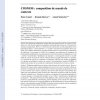Free Online Productivity Tools
i2Speak
i2Symbol
i2OCR
iTex2Img
iWeb2Print
iWeb2Shot
i2Type
iPdf2Split
iPdf2Merge
i2Bopomofo
i2Arabic
i2Style
i2Image
i2PDF
iLatex2Rtf
Sci2ools
TSI
2008
2008
COSMOS, composition de noeuds de contexte
Ubiquitous applications are facing a large diversity of execution contexts. However, this diversity requires some continual adaptation to preserve the correct execution of these applications. Consequently, the observation of the execution context plays an important role. Even if "user-centered" and "system" approaches have proven their relevance in this domain, they suffer from some limitations when expressing the composition of inferences and when considering the scalability issue. Therefore, we propose to reorganise the classical functionalities of a context manager to systematically introduce cycles "collect / interpretation / identification of situations". This approach is based on the definition of the concept of context nodes composed in a graph (hierarchy with sharing), and the mapping of the concept into components and software architecture for easing the definition and the management of context management policies. Our proposition, named COSMOS, i...
| Added | 15 Dec 2010 |
| Updated | 15 Dec 2010 |
| Type | Journal |
| Year | 2008 |
| Where | TSI |
| Authors | Denis Conan, Romain Rouvoy, Lionel Seinturier |
Comments (0)

